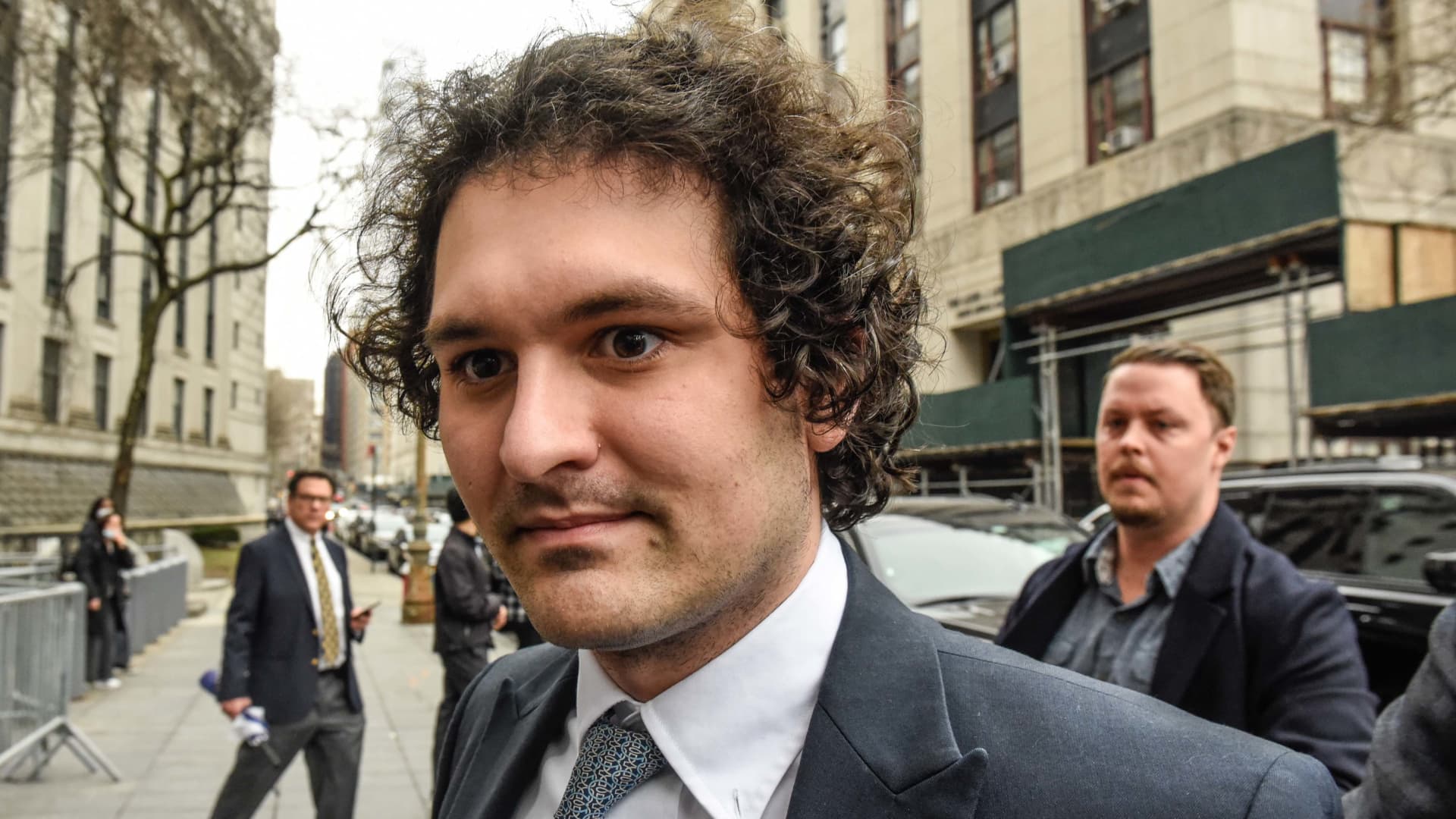Sam Bankman-Fried, co-founder of FTX Cryptocurrency Derivatives Exchange, arrives at court in New York, US, on Thursday, Feb. 16, 2023.
Stephanie Keith | Bloomberg | Getty Images
Lawyers for Sam Bankman-Fried are asking a judge for a relatively short sentence like “junk bond king” Michael Milken instead of the 100 years that a presentence investigation report calls for.
In a new court filing, attorneys for Bankman-Fried asked for a sentence of between 63 and 78 months in prison for overseeing the huge financial fraud at his cryptocurrency exchange FTX and related hedge fund Alameda Research.
That filing, among other things, cites his “neurodiversity,” selflessness and “kindness” — and strongly disputes claims he cost his companies’ customers billions of dollars with fraud.
“Sam Bankman-Fried has been described as a ‘sociopath,’ ‘a man with no morals, remorse or empathy,’ who is an ‘an ice-cold manipulator, bully and shameless liar,'” his lawyers told Manhattan federal court Judge Lewis Kaplan in the filing.
“But they don’t know the true Sam Bankman-Fried,” the attorneys argued in rebutting the 100-year prison term recommended by a presentence investigation report by federal probation officials.
The lawyers wrote that Bankman-Fried, 31, is “full of regret for the enormous damage that he has caused his (former) friends, family, partners, colleagues, and the causes he cared so deeply about.”
The filing quotes a letter from his mother, Barbara Fried, who wrote that her son “has been wracked with remorse for not having prevented the implosion of FTX and the damage that followed.”
“It is, he has told me, the first thing he thinks about when he wakes up and the last thing he thinks about when he goes to sleep, and it occupies many moments in between,” wrote Fried, who like her husband, Joseph Bankman, is a Stanford law professor.
Bankman-Fried has been in jail since his bail was revoked in August, eight months after he was indicted on multiple fraud charges and other counts related to the dramatic collapse of FTX in late 2022.
He was convicted at trial in November and is due to be sentenced on March 28.
The Manhattan U.S. attorney’s office, which prosecuted Bankman-Fried, has yet to file its sentencing recommendation but is expected to call for a much stiffer sentence than that called for by defense lawyers in their new filing.
U.S. Attorney Damian Williams in November said, “Bankman-Fried perpetrated one of the biggest financial frauds in American history,” and scoffed at the idea that the FTX founder’s conduct was motivated by altruism.
“This case has always been about lying, cheating, and stealing, and we have no patience for it,” Williams said at the time.
In their new, nearly 100-page document, defense attorneys marshal an array of arguments designed to get Kaplan to dramatically depart downward from federal sentencing guidelines, which recommend that he give Bankman-Fried 100 years or more in prison.
“That recommendation is grotesque,” the defense team led by attorney Marc Mukasey wrote in the filing.
“This Court should reject the [Presentence Investigation Report’s] barbaric proposal.”
The federal guidelines in the case suggest a draconian sentence for Bankman-Fried in large part as the result of the $10 billion loss by FTX and Alameda Research customers in the case, as the PSR concluded.
Defense lawyers in their sentencing submission said that the loss calculation is unsupported by evidence, arguing that “the most reasonable estimate of loss is zero.”
The filing notes that last month, debtors’ attorneys in the bankruptcy case of FTX and Alameda said that “customers and creditors who can prove their losses are expected to get back all of their money.”
“The harm to customers, lenders, and investors is zero,” Bankman-Fried’s lawyers wrote.
In addition to attacking at length the rationale of the sentencing guidelines’ recommendation, SBF’s lawyers spent a large chunk of the filing detailing his personal history, psychological makeup and “charitable works.”
It says he created Alameda and then FTX as engines to make money that could then be given to various altruistic endeavors, in line with Bankman-Fried’s embrace of the philosophy known as “effective altruism.”
The filing describes him as a “shy” child who “often struggled socially,” who in high school “realized he was anhedonic, or unable to experience joy or pleasure.”
“As Sam describes it, he experiences negative emotions in ways that are not very different from many other people — neither much more extreme, nor much less negative. But he does not feel pleasure, or happiness, or joy, even when something very good happens to him,” the filing says.
“In college, he was officially diagnosed as suffering from anhedonic depression and he has been on antidepressant medication ever since.”
The lawyers wrote that Bankman-Fried has a “neurodiversity” that “greatly affects how he perceives and is perceived.”
The filing does not explicitly call Bankman-Fried autistic or say he is on the autism spectrum, but several times mentions his neurodiversity in connection with references to those terms.
“Neurodiversity is a medical concept that recognizes the variation in human neurology. It acknowledges that neurological differences, such as those associated with Asperger’s, ASD, and [Attention Deficit Hyperactivity Disorder] are part of the spectrum of diversity of the human brain that exists,” the filing says.
“Sam’s condition manifests in a wide variety of ways. No two individuals on the spectrum are exactly alike. It is not a disease or a condition that needs to be cured,” the lawyers wrote. “Instead, it is a fundamental aspect of an individual’s identity—an aspect to be considered at sentencing.”
The filing says that because of his condition, “Sam is uniquely vulnerable in a prison population.”
“Individuals with ASD are often at considerably greater risk of physical harm and extortion in prison than other inmates,” the lawyers wrote.
The attorneys argued that Bankman-Fried is “not at risk of committing further crimes,” and had already been harshly punished by the poor conditions in the Brooklyn, New York, federal jail where he has been locked up since last summer.
The filing urged the judge to sentence Bankman-Fried along the lines of the sentence imposed on so-called junk bond king Michael Milken, who received a 10-year term for the fraud he committed at the investment bank Drexel Burnham Lambert in the 1980s, but only ended up serving two years behind bars.
“Milken was released from custody at an age when he was young enough to still make a positive impact,” the lawyers argued. “And he became a tremendous force for good in the world.”
“Milken’s two-year sentence gave him a second chance. He has changed the lives of countless others for the better with that chance,” the filing said.
“Given the same chance, Sam would dedicate his post-prison life to charitable works, finding the best ways to help others, and put them into practice, consistent with his commitment to effective altruism.”
Don’t miss these stories from CNBC PRO:







